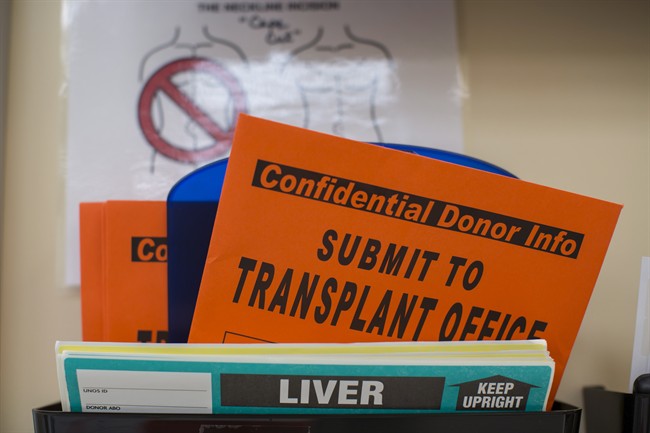Policies preventing the families of deceased organ donors from identifying organ recipients is “outdated and unfair” and should be changed, several Western University researchers say, adding that direct contact between consenting parties can be beneficial.

In addition, the group says social media has made it easier for donor families and organ recipients to find one another, making existing policy, which prevents organ donation organizations from developing policy to support direct contact, obsolete.
The call for change comes in a commentary piece published this week in the Canadian Journal of Cardiology, penned by several Western researchers, including bioethicist Charles Weijer and post-doctoral fellow Nicholas Murphy.
“We’re calling for a working group to convene to explore responsible policy for enabling direct contact between deceased donors’ families and organ recipients,” Murphy said in an interview Thursday.
“The working group should consist of stakeholders, such as donor families and organ recipients, as well as provincial organ donation organizations, legal scholars and ethicists.”
Current legislature in Ontario, like across most of Canada, stipulates mandated anonymity in deceased organ donations, meaning donor families aren’t allowed to know who received their loved one’s organs, and vice versa, Murphy said.
Some contact is allowed in the form of letters, facilitated through the province’s organ donation organization, the Trillium Gift of Life Network, however, the letters must be anonymous and must not contain any personal details about the sender, he said.
Murphy notes that the anonymity rules had good reasons for being enacted, and were well-intentioned, noting concerns about the potential emotional impact that could come from donor families and organ recipients meeting.
“There can be a danger of complicating the grief of the deceased donor’s family. The organ recipient may feel a sense of indebtedness that might not be welcome,” he said.
“There might be emotional demands each party is putting on the other, or differing expectations about what the nature of the relationship should be.”
However, given the rise of social media, which has allowed donor families and recipients to find one another on their own, exposing themselves to the risks that prompted the anonymity rules to begin with, Murphy says the legislation should be re-evaluated to allow a framework to facilitate such contact, should both parties consent.
Other jurisdictions, such as British Columbia, allow for direct contact between donor families and organ recipients, with Transplant B.C. acting as a facilitator.

Get weekly health news
“We’re certainly not advocating an end to gatekeeping entirely,” Murphy stressed.
“What we want to do is allow or encourage organ donation organizations to develop policies that allow people who want it to be allowed to meet each other. We think that the restrictions are an unfair infringement of the autonomy of competent adults, and we think it’s wrong.”
The researchers argue that evidence suggests that direct contact between donor families and organ recipients can be beneficial, albeit not for everyone, and that policy should both enable people to meet if they wish, but also allow for anonymity to be protected if one should want it.
They cite the case of Kim LeBlanc and Dave Allingham, who are listed as co-authors of the commentary piece.
LeBlanc’s son, Tyler Schwering, 15, was fatally struck by a tractor-trailer on Guelph’s Hanlon Parkway in May of 2012. Tyler’s family agreed to donate his organs, and within hours, the teen’s heart was being placed into the chest of Dave Allingham, 40, of Ancaster, saving his life. Several others also received Schwering’s organs.
More than a year later, LeBlanc and Allingham managed to connect through social media and a mutual acquaintance and get together, a meeting that was covered in the news at the time.
“We were conducting research into the psychological supports available to deceased donors’ families when we came across this video telling Kim and Dave’s story,” Murphy said.
“We were so moved by the power of their story, the healing that came about through this process of meeting…. We were quite surprised that this is quite rare and that it’s not allowed. We thought that the benefits that Kim and Dave experienced should be open to more people.”
Global News reached out to the Canadian Society of Transplantation for comment on this piece, but no comment was immediately available.
A survey of CST members conducted in 2015 found that some 71 per cent of respondents felt donor families and recipients should only communicate anonymously, “yet 47 per cent felt that identifying information could be included” in letters between consenting parties.
Asked whether organ recipients and donor families should be allowed to meet, 53 per cent agreed, while 27 per cent disagreed and 20 per cent were neutral.
The survey, sent out to 541 CST members, saw 106 respond. The survey’s findings were published in the journal Transplantation Proceedings in December 2015.
“Perhaps a bit surprisingly, the issue can be somewhat polarizing. Public trust is sacrosanct in the domain of organ transplantation and donation. Anything that could conceivably jeopardize that trust needs to be very carefully evaluated,” Murphy said.
“However, there’s a growing recognition in the medical community, from my perspective, that we really need to address the new reality brought on by social media.”

Thirty-eight per cent of respondents felt current policies around anonymity should be evaluated, with social media making it easier for organ recipients and donor families to connect.
An updated survey has not been taken, so it’s unclear how attitudes have changed among CST members in the years since.
“You’ll find people on both sides. Some say, ‘Absolutely, this is a slam dunk. We should respect their autonomy and they should have a choice.’ And there are other perspectives that think that that’s a bit unwise and it’s best to stay the course,” Murphy said.
“Obviously, we come down on one side, and we’re trying to start a conversation about this. These are some of the issues that the working group we’re calling for should explore.”













Comments